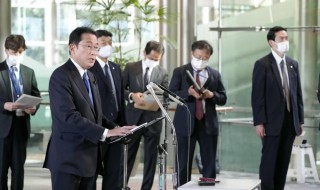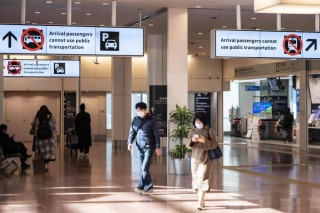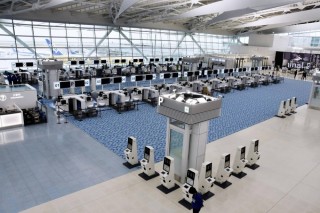Loading
Search
▼ Japan To Bar All New Foreign Visitors As Omicron Fears Grow
- Category:Other
The government announced Monday that it will ban all incoming foreign travelers for one month effective Tuesday in an effort to prevent the omicron variant from spreading domestically.
New restrictions will encompass all new entries — including foreign exchange students, interns and those traveling for business — from every country in the world.
The entry ban will not affect Japanese nationals or foreign residents returning to the country, Prime Minister Fumio Kishida said, but those returning from designated countries where the variant has been reported will need to isolate at a government-designated facility for three to 10 days.
“This is a preventative, emergency measure to avoid a worst-case scenario,” Kishida told reporters Monday afternoon.
“Research is needed to determine how contagious the omicron variant is globally, and whether vaccines are still effective in preventing transmission or severe symptoms,” he said. “It’s crucial that we respond to the situation quickly and flexibly.”
Entry into Japan from nine African countries had been tightened over the weekend after a fervor of chilling reports emerged last week about a new virus strain discovered in South Africa that experts warn could be more contagious than all previous iterations of COVID-19.
One traveler from Namibia — one of the nine countries included in the initial announcement — had tested positive for COVID-19 while under quarantine at a dedicated facility in Japan, health minister Shigeyuki Goto said Monday. The individual is being screened for the omicron variant by the National Institute of Infectious Diseases (NIID), a process that health ministry officials said will take four to five days.
The health ministry said Monday that the country’s daily entry cap, which was raised to 5,000 travelers on Friday, will be lowered again to 3,500 on Wednesday.
“The country is buying time,” said Koji Wada, a professor of public health at the International University of Health and Welfare and a member of the health ministry’s expert coronavirus panel. “If the variant hasn’t already arrived in Japan, itwill soon, so the next challenge will be that of containment.”
Less than a month has passed since Japan began loosening its border policies amid a slump in new cases. Effective Nov. 8, new entries were allowed for the first time in nearly a year provided they quarantine for 14 days, or for 10 days if they were fully vaccinated.
Beginning Tuesday, new entries will be banned for one month.
Entry restrictions will also tighten for Japanese nationals and foreign residents, who will be required to spend 10 days at a government-designated facility and four more at a location of their choice if they are returning from any of the following countries: Botswana, Eswatini, Lesotho, Namibia, South Africa, Zimbabwe, Mozambique, Malawi, Zambia and Angola.
Similarly, those from Israel, the U.K., the Netherlands and Italy will be required to quarantine for six days at a government-designated facility and eight more days at a chosen location.
Those from Australia, Germany, the Czech Republic, Denmark, Hong Kong, France, Canada’s Ontario, Belgium and Austria will be required to quarantine for three days at a designated facility and 11 more at a place of their choosing.
“The country is buying time,” said Koji Wada, a professor of public health at the International University of Health and Welfare and a member of the health ministry’s expert coronavirus panel. “If the variant hasn’t already arrived in Japan, itwill soon, so the next challenge will be that of containment.”
Less than a month has passed since Japan began loosening its border policies amid a slump in new cases. Effective Nov. 8, new entries were allowed for the first time in nearly a year provided they quarantine for 14 days, or for 10 days if they were fully vaccinated.
Beginning Tuesday, new entries will be banned for one month.
Entry restrictions will also tighten for Japanese nationals and foreign residents, who will be required to spend 10 days at a government-designated facility and four more at a location of their choice if they are returning from any of the following countries: Botswana, Eswatini, Lesotho, Namibia, South Africa, Zimbabwe, Mozambique, Malawi, Zambia and Angola.
Similarly, those from Israel, the U.K., the Netherlands and Italy will be required to quarantine for six days at a government-designated facility and eight more days at a chosen location.
Those from Australia, Germany, the Czech Republic, Denmark, Hong Kong, France, Canada’s Ontario, Belgium and Austria will be required to quarantine for three days at a designated facility and 11 more at a place of their choosing.
Unlike other vaccinated travelers, those returning from any of the 23 countries listed above will not be eligible for a shortened 10-day quarantine and will need to quarantine for 14 days even if they have been vaccinated twice.
Travelers from certain countries where COVID-19 is still spreading were already subject to quarantine requirements, but the announcement Monday expanded that list to account for the omicron variant.
Since earlier this month, the central government has been making preparations for a possible sixth wave of the pandemic by strengthening hospital capacity, bolstering virus testing and readying boosters for a December rollout for medical personnel.
But reports of the omicron variant pushed the central government to reimpose restrictions.
Although the timing is fortuitous since the country was already preparing for a sixth wave, Wada said strong border restrictions meant to block the omicron variant will only “delay the inevitable.”
“The country should use that time to raise its capacity for virus testing and genomic screening so that it can better detect the omicron variant,” Wada said. “That would give Japan a chance to get ahead and maybe prevent it from spreading rapidly.”
The omicron variant, after first being detected last week in South Africa, has spread across Europe and reached as far as Australia and Hong Kong.
The world is bracing itself amid speculative reports that it may be even more transmissible than the delta variant, which is thought to be twice as contagious as the original strain of the coronavirus that began to wreak havoc in several countries earlier this year.
While scientists are adamant that currently available vaccines remain effective in preventing severe COVID-19 symptoms, more time and research is needed to uncover the inner workings of the omicron variant.
Soon after reports of the variant emerged, Israel announced it would close its borders to all foreigners for at least two weeks, and the state of New York announced a state of emergency.
The omicron variant “has the molecular characteristics that would strongly suggest that it would be more transmissible” than other variants, U.S. infectious disease expert Anthony Fauci told ABC News on Sunday.
On Friday, the World Health Organization designated omicron a “variant of concern.” Two days later, the NIID followed suit by raising its alert status regarding the omicron variant from its second highest level to its third and highest.
The omicron variant contains some 30 mutations — the highest of all known COVID-19 strains — according to the NIID, which suggests a strong possibility that it’s the most transmissible.
Previously, the delta variant exacerbated the pandemic after first being detected in India in late 2020 and then spreading rapidly abroad.
States of emergency, restrictions on public dining and other countermeasures in Japan had already begun to lose impact due to the voluntary nature of the country’s infectious disease policies.
The highly contagious delta variant only made things worse, spreading rapidly throughout the country until the outbreak reached a record-breaking peak during a fifth wave in August.
Travelers from certain countries where COVID-19 is still spreading were already subject to quarantine requirements, but the announcement Monday expanded that list to account for the omicron variant.
Since earlier this month, the central government has been making preparations for a possible sixth wave of the pandemic by strengthening hospital capacity, bolstering virus testing and readying boosters for a December rollout for medical personnel.
But reports of the omicron variant pushed the central government to reimpose restrictions.
Although the timing is fortuitous since the country was already preparing for a sixth wave, Wada said strong border restrictions meant to block the omicron variant will only “delay the inevitable.”
“The country should use that time to raise its capacity for virus testing and genomic screening so that it can better detect the omicron variant,” Wada said. “That would give Japan a chance to get ahead and maybe prevent it from spreading rapidly.”
The omicron variant, after first being detected last week in South Africa, has spread across Europe and reached as far as Australia and Hong Kong.
The world is bracing itself amid speculative reports that it may be even more transmissible than the delta variant, which is thought to be twice as contagious as the original strain of the coronavirus that began to wreak havoc in several countries earlier this year.
While scientists are adamant that currently available vaccines remain effective in preventing severe COVID-19 symptoms, more time and research is needed to uncover the inner workings of the omicron variant.
Soon after reports of the variant emerged, Israel announced it would close its borders to all foreigners for at least two weeks, and the state of New York announced a state of emergency.
The omicron variant “has the molecular characteristics that would strongly suggest that it would be more transmissible” than other variants, U.S. infectious disease expert Anthony Fauci told ABC News on Sunday.
On Friday, the World Health Organization designated omicron a “variant of concern.” Two days later, the NIID followed suit by raising its alert status regarding the omicron variant from its second highest level to its third and highest.
The omicron variant contains some 30 mutations — the highest of all known COVID-19 strains — according to the NIID, which suggests a strong possibility that it’s the most transmissible.
Previously, the delta variant exacerbated the pandemic after first being detected in India in late 2020 and then spreading rapidly abroad.
States of emergency, restrictions on public dining and other countermeasures in Japan had already begun to lose impact due to the voluntary nature of the country’s infectious disease policies.
The highly contagious delta variant only made things worse, spreading rapidly throughout the country until the outbreak reached a record-breaking peak during a fifth wave in August.
- November 29, 2021
- Comment (0)
- Trackback(0)




